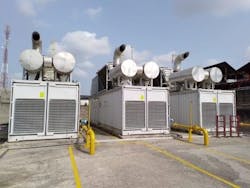Connecticut Community chooses CHP-Solar-Battery Microgrid for Rec Center
Clarke Energy USA Inc, a KOHLER Company, will provide a combination microgrid solution for the newly upgraded Middletown Recreation Center in Connecticut.
The local council has made significant investment for the renovation of the Middletown Recreation Center, which includes a new recreation office and renovation of the gyms and pools. The building will also be used as a heating and cooling center and a microgrid system will keep the building running during an outage.
“The town is looking forward to the finalization of the upgrades to this recreation center,” Middletown’s Acting Director of the Department of Public Works, Chris Holden said. “We see sustainable, resilient energy as key to the longevity of these community facilities and we are pleased to be supported by Symbiont Energy and Clarke Energy in this endeavor.”
The microgrid system provided by Clarke Energy will have its CHP unit as the base energy source, supplying 35kW of electricity and 204.1kBTU per hour of hot water at high efficiency. The CHP will enable the microgrid to black-start.
A solar photovoltaic array will provide renewable electricity and surplus energy will be stored in a battery energy storage system for peak shaving. A KOHLER KG100 back-up gas-fueled generator will support the site, ensuring resilience. A centralized microgrid controller will coordinate the energy resources.
This system is expected to reduce CO2 emissions by 192 tons per year. X-Caliber Rural Funding is the funding partner on this project.
The city demolished the old Woodrow Wilson Middle School building to make way for construction of the new recreation center. Leaders see it as a focal point for community life in the future.
The drive for smart cities include a move to more advanced digital technologies and also energy resiliency in the form of microgrids.
See EnergyTech's Mission Critical Microgrid series on Airports and Humantarian Efforts
